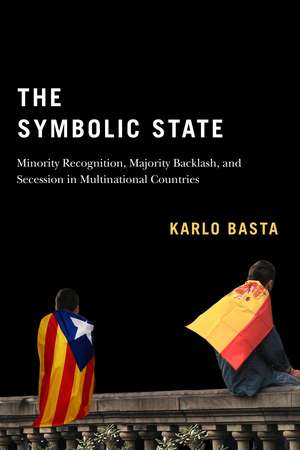The Symbolic State: Minority Recognition, Majority Backlash, and Secession in Multinational Countries: Democracy, Diversity, and Citizen Engagement Series, cartea 7
Autor Karlo Bastaen Limba Engleză Paperback – 14 noi 2021
The nation-state is a double sleight of hand, naturalizing both the nation and the state encompassing it. No such naturalization is possible in multinational states. To explain why these countries experience political crises that bring their very existence into question, standard accounts point to conflicts over resources, security, and power. This book turns the spotlight on institutional symbolism.When minority nations in multinational states press for more self-government, they are not only looking to protect their interests. They are asking to be recognized as political communities in their own right. Yet satisfying their demands for recognition threatens to provoke a reaction from members of majority nations who see such changes as a symbolic repudiation of their own vision of politics. Secessionist crises flare up when majority backlash reverses symbolic concessions to minority nations. Through a synoptic historical sweep of Canada, Spain, Yugoslavia, and Czechoslovakia, The Symbolic State shows us that institutions may be more important for what they mean than for what they do.A major contribution to the study of comparative nationalism and secession, comparative politics, and social theory, The Symbolic State is particularly timely in an era when the power of symbols – exemplified by Brexit, the Donald Trump presidency, and the rise of the Black Lives Matter movement – is reshaping politics.
Preț: 247.19 lei
Nou
Puncte Express: 371
Preț estimativ în valută:
47.30€ • 49.65$ • 39.26£
47.30€ • 49.65$ • 39.26£
Carte disponibilă
Livrare economică 20 martie-03 aprilie
Livrare express 06-12 martie pentru 28.32 lei
Preluare comenzi: 021 569.72.76
Specificații
ISBN-13: 9780228008064
ISBN-10: 0228008069
Pagini: 272
Ilustrații: 6 diagrams, 16 tables
Dimensiuni: 152 x 229 x 23 mm
Greutate: 0.42 kg
Editura: McGill-Queen's University Press
Colecția McGill-Queen's University Press
Seria Democracy, Diversity, and Citizen Engagement Series
ISBN-10: 0228008069
Pagini: 272
Ilustrații: 6 diagrams, 16 tables
Dimensiuni: 152 x 229 x 23 mm
Greutate: 0.42 kg
Editura: McGill-Queen's University Press
Colecția McGill-Queen's University Press
Seria Democracy, Diversity, and Citizen Engagement Series
Recenzii
“Basta’s study represents a much welcomed, needed, and highly recommendable book for multiple strands of scholarship, not just for the comparative study of multinational states, but even on the state as well as comparative politics in general." Zeitschrift für Vergleichende Politikwissenschaft
“An innovative perspective on secessionist claims in multinational states. … Basta’s contribution opens up new ways to address secessionist claims in multinational states, the symbolic sway of institutional recognition, and the importance of unambiguous signalling by majority groups in the run-up to secession. In particular, by analysing processes and the symbolic meaning of institutions, he provides a useful contribution to the scholarship on multinational states and comparative politics.” Europe/Asia Studies
“This is a book of many virtues and it should be celebrated.” Publius: The Journal of Federalism
"The Symbolic State is a theoretically and empirically ambitious book that challenges scholars of decentralization and secessionism to consider the distinctive dynamics that occur within multinational states. In particular it challenges broad-brush theories of federalism and 'indirect rule' that assume a universal relationship between territorial concessions and self-determination demands. The phenomenon is far more complex and contingent than much of the existing research acknowledges." Jason Sorens, Saint Anselm College and author of Secessionism: Identity, Interest, and Strategy
Notă biografică
Karlo Basta is lecturer of politics and co-director of the Centre on Constitutional Change at the University of Edinburgh.
Descriere
Karlo Basta’s surefooted treatment of asymmetric federalism to accommodate the presence of more than one nation in a single state is as original as it is sound. Joining the logic of political economy to that of symbolic recognition, he produces a coherent picture of the interplay between central governments and minority nations. — Donald Horowitz, Duke University




